Navigating the world of small business can be a daunting task, with various decisions to make, from choosing your location to picking your suppliers. One such vital decision is selecting a credit card machine for your business.
The right card machine can not only streamline your operations but also enhance your customers’ experience, leading to increased satisfaction and repeat business. However, with an array of options available in the market, it can be challenging to know where to start.
Featured pro tools
This article aims to simplify your decision-making process by providing a comprehensive comparison and review of the 15 best credit card machines for small businesses. We’ll explore their features, pros and cons, costs, and transaction fees, to help you select the one that best suits your specific business needs. Let’s dive in.
Best credit card machines for UK small businesses
| Card Machine | Purchase Price | Transaction Fee |
|---|---|---|
| Zettle Reader 2 | £59 | 1.75% |
| Square Reader | £16 | 1.75% |
| SumUp Air | £39 | 1.69% |
| PayPal Here | £45 | 2.75% |
| WorldPay Reader | £69.99 | 2.75% – 0.75% |
| Barclaycard Anywhere | £29.95 | 1.7% |
| Paymentsense Mobile | £19.95 | 1.6% |
| TakePayments Mobile | £19.99 | 1.6% |
| EPOS Now | £119.99 | 2.49% – 0.75% |
| myPOS Go 2 | £39 | 1.75% |
| Handepay | £19.99 | 1.5% |
| Zettle Pro | £39 | 1.25% |
| Shopify POS | £79 | 2.2% + 20p |
| Clover Mini | £249 | 2.3% + 20p |
| Elavon MobileMerchant | £25 | 1.5% |
Note: These fees represent a simplified version of the pricing for these credit card machines. Many providers have more complex pricing structures that include different rates for different types of cards or different monthly volumes of transactions. The actual cost may vary based on these factors, as well as whether you choose to add on additional services or features. Always review the full pricing details carefully before making a decision.
Zettle Reader 2
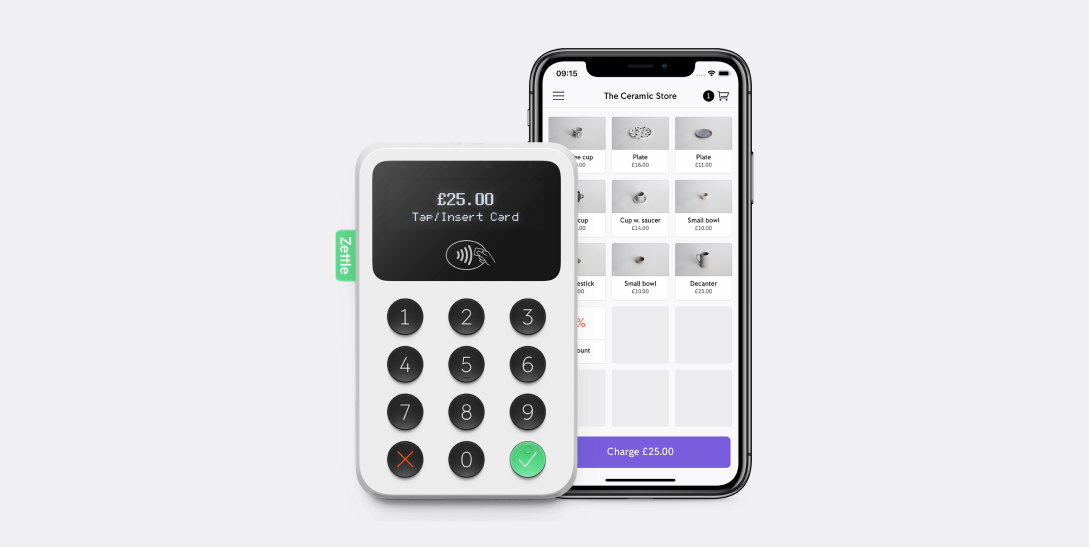
This card machine is popular for its low transaction fee, ease of use, and fast payment processing.
Zettle also comes with free point-of-sale software and has no fixed monthly costs.
- Pros: Affordable, user-friendly, offers fast payment processing.
- Cons: It does not integrate with all point-of-sale systems.
Fees and charges
- Card Reader Cost: Zettle Reader 2: £59 + VAT
- Transaction Fees: Chip & PIN, contactless: 1.75% per transaction
- Monthly Fee: No fixed monthly fee
- Refund Fees: Refunds are free
- Chargeback Fee: £10 per chargeback
- Currency Conversion Fee: 2.5% for transactions in currencies other than GBP
- Settlement Time: Next business day settlement
Further information
Read our Zettle review or visit the website.
Square Reader
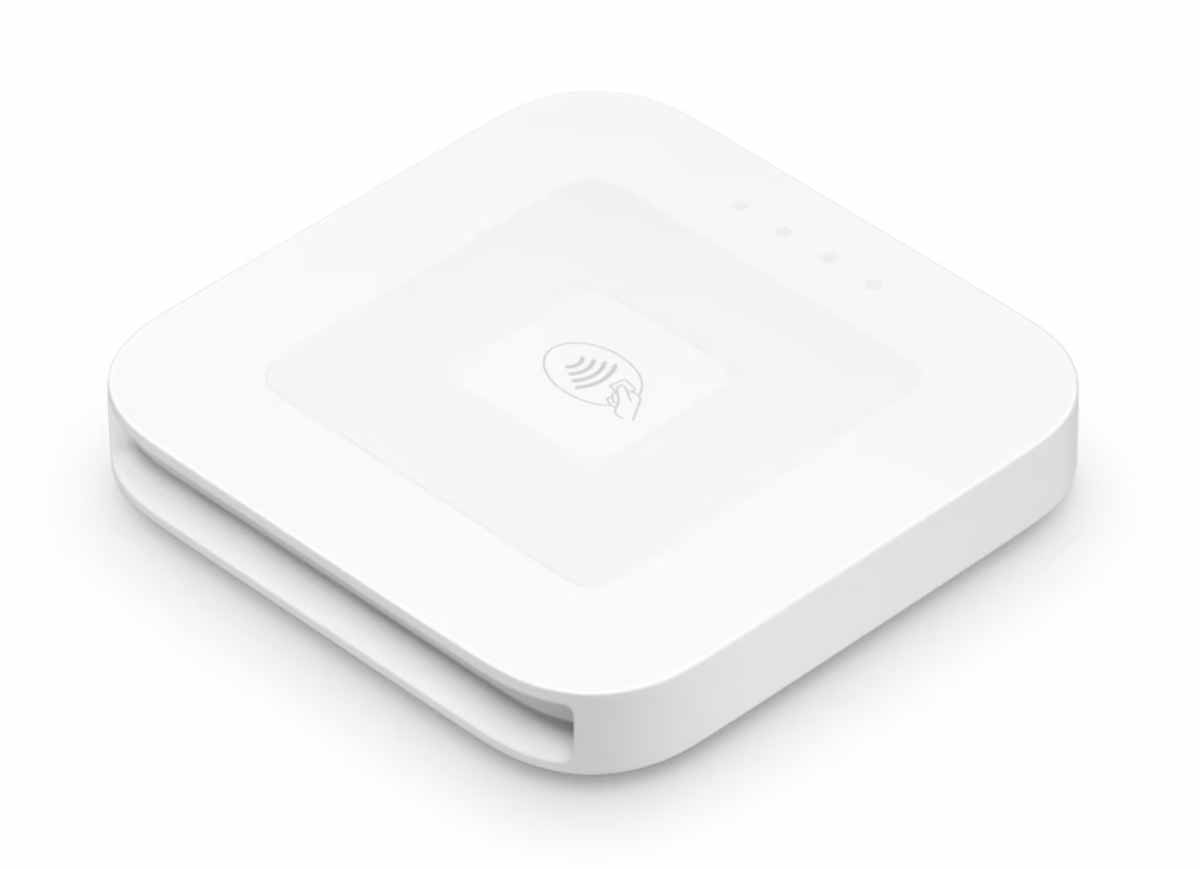
Square is widely recognised for its accessibility and user-friendly design. With a simple flat rate fee structure, it is ideal for small businesses that don’t want to worry about varying fees.
- Pros: Accessible, user-friendly, and offers a simple flat rate fee structure.
- Cons: Limited advanced features compared to other options.
Fees and charges
- Card Reader Cost:
- Square Reader for Contactless and Chip: £19 + VAT
- Square Reader for Magstripe: £19 + VAT
- Square Reader for Chip and PIN: £39 + VAT
- Square Stand for Contactless and Chip: £69 + VAT
- Transaction Fees:
- Chip & PIN, contactless: 1.75% per transaction
- Virtual Terminal and Online Payments: 2.5% per transaction
- Monthly Fee: No fixed monthly fee for the basic plan
- Refund Fees: Refunds are free
- Chargeback Fee: £15 per chargeback
- Currency Conversion Fee: 1% for transactions in currencies other than GBP
- Settlement Time: Next business day settlement
Further information
Read our Square review or visit the website.
SumUp Air
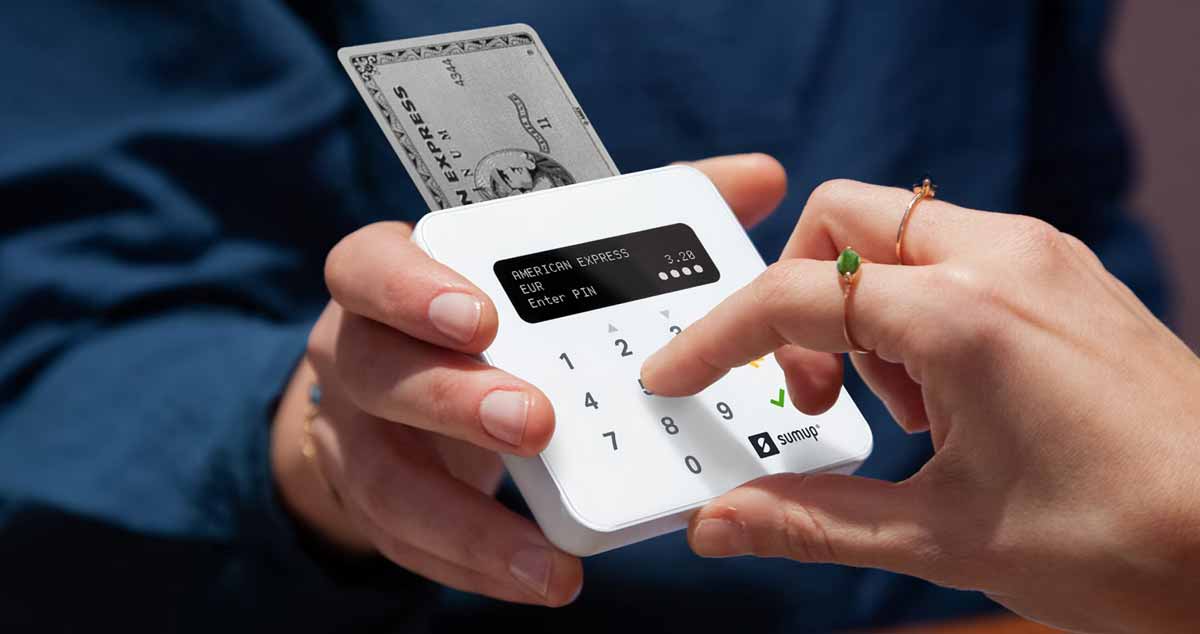
This machine is perfect for businesses that process a low volume of card transactions. It has an affordable price and lower transaction fees for low volume users. Learn more about Sumup.
- Pros: Affordable with lower transaction fees for low-volume users.
- Cons: Not ideal for high-volume businesses due to its transaction fee structure.
Fees and charges
- Card Reader Cost: SumUp Air Card Reader: £39 + VAT
- Transaction Fees: Chip & PIN, contactless: 1.69% per transaction
- Monthly Fee: No fixed monthly fee
- Refund Fees: Refunds are free
- Chargeback Fee: £0 per chargeback
- Currency Conversion Fee: 2.75% for transactions in currencies other than GBP
- Settlement Time: Next business day settlement
Further information
Read our SumUp review or visit the website.
PayPal Here
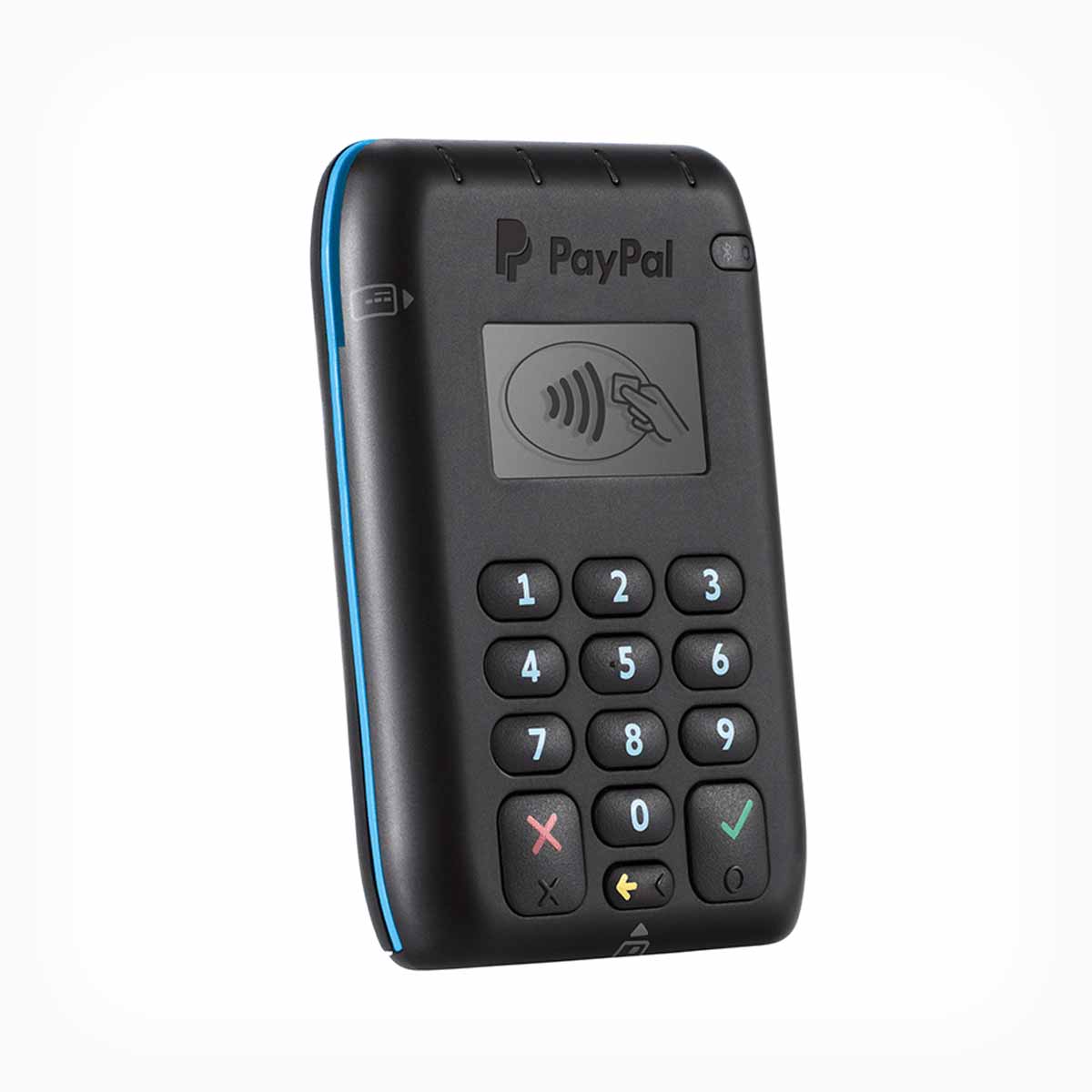
This machine offers integration with PayPal, allowing businesses to manage all transactions within one system. The transaction fee is a bit higher, but the integration benefits can outweigh the costs for many businesses.
- Pros: Integrates seamlessly with PayPal, allowing businesses to manage all transactions within one system.
- Cons: Transaction fee is slightly higher compared to others.
Fees and charges
- Card Reader Cost: PayPal Here Chip and PIN Card Reader: £45 + VAT
- Transaction Fees:
- Chip & PIN, contactless: 1.75% per transaction for in-person payments
- Virtual Terminal and PayPal Payments: 2.9% + £0.30 per transaction for online payments
- Monthly Fee: No fixed monthly fee
- Refund Fees: Refunds are free
- Chargeback Fee: £14 per chargeback
- Currency Conversion Fee: 2.5% for transactions in currencies other than GBP
- Settlement Time: Next business day settlement
Further information
Read our PayPal review or visit the website.
WorldPay Reader
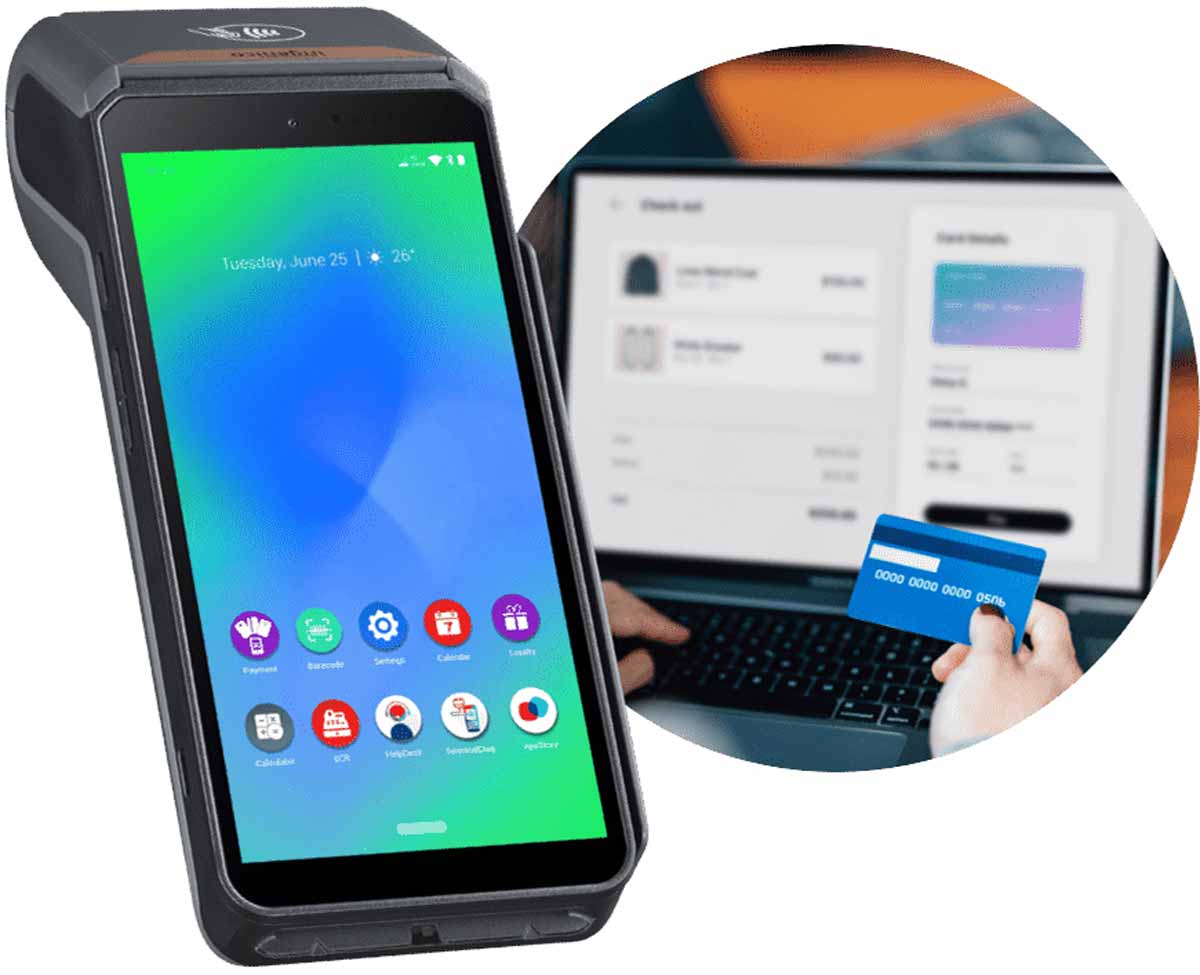
WorldPay offers a variety of pricing plans, which can be customized to suit your business needs. It is an established brand with a reputation for reliability.
- Pros: Variety of customisable pricing plans and an established, reliable brand.
- Cons: The fee structure can be complicated and may not be ideal for smaller businesses.
Fees and charges
- Card Reader Cost: WorldPay Reader: £49 + VAT (one-time cost)
- Transaction Fees: Chip & PIN, contactless: Approximately 2.75% per transaction
- Monthly Fee: Monthly fees can range from £19 to £49, depending on your business type and requirements.
- Refund Fees: £0.30 per refund
- Chargeback Fee: £25 per chargeback
- Currency Conversion Fee: 2.75% for transactions in currencies other than GBP
- Settlement Time: Next business day settlement for transactions processed before a certain cutoff time (e.g., 9 pm)
These figures are indicative and may vary depending on your specific agreement with WorldPay and other factors. It’s advisable to contact WorldPay directly to obtain precise pricing information tailored to your business needs.
Further information
Read our Worldpay review or visit the website.
Barclaycard Anywhere
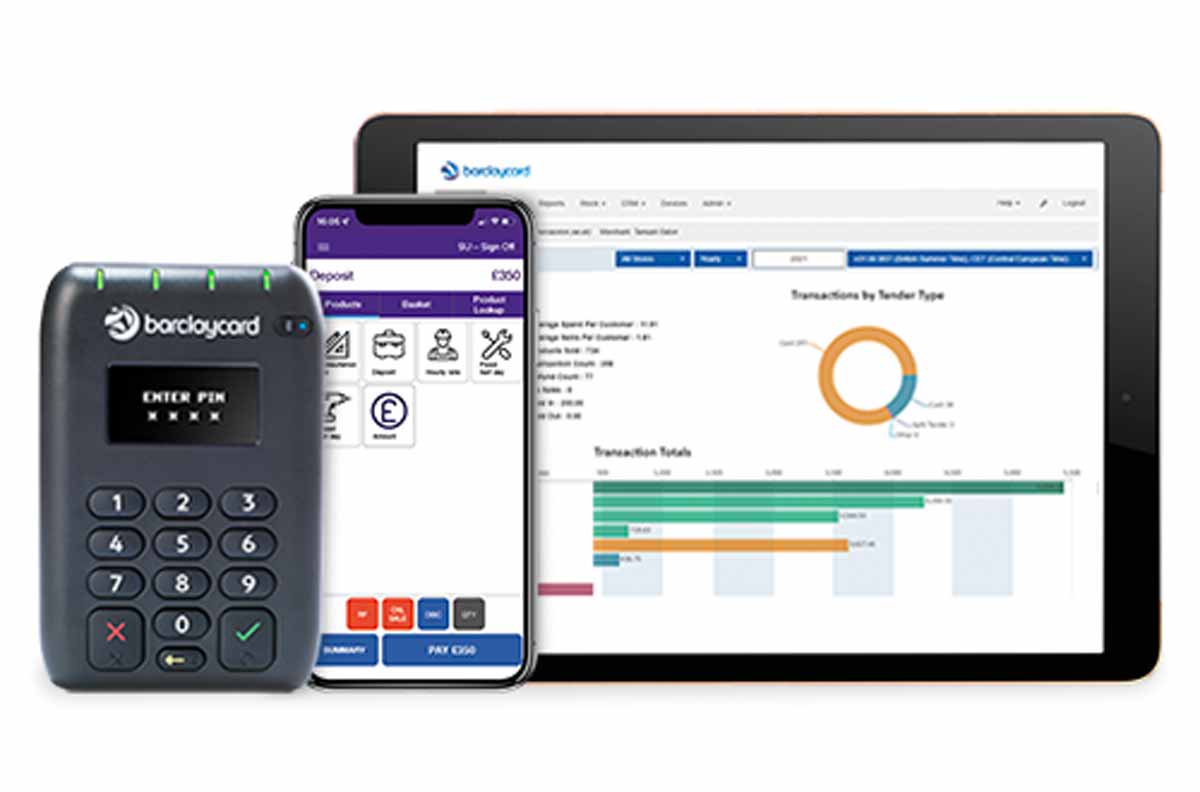
Barclaycard‘s solution is easy to use and has the backing of one of the biggest banks in the UK. It offers competitive transaction fees and a robust customer support system.
- Pros: Easy to use, competitive transaction fees, and robust customer support.
- Cons: Has a relatively smaller feature-set than other devices.
Fees and charges
- Card Reader Cost: Barclaycard Anywhere Mobile Card Reader: £29 + VAT (one-time cost)
- Transaction Fees: Chip & PIN, contactless: 1.6% – 2.6% per transaction, depending on your monthly sales volume and business type
- Monthly Fee: No fixed monthly fee
- Refund Fees: Refund fees may apply, typically around £0.10 to £0.30 per refund
- Chargeback Fee: £25 per chargeback
- Currency Conversion Fee: 2.99% for transactions in currencies other than GBP
- Settlement Time: Next business day settlement for transactions processed before a certain cutoff time (e.g., 9 pm)
Further information
Read our Barclaycard review or visit the website.
Paymentsense Mobile
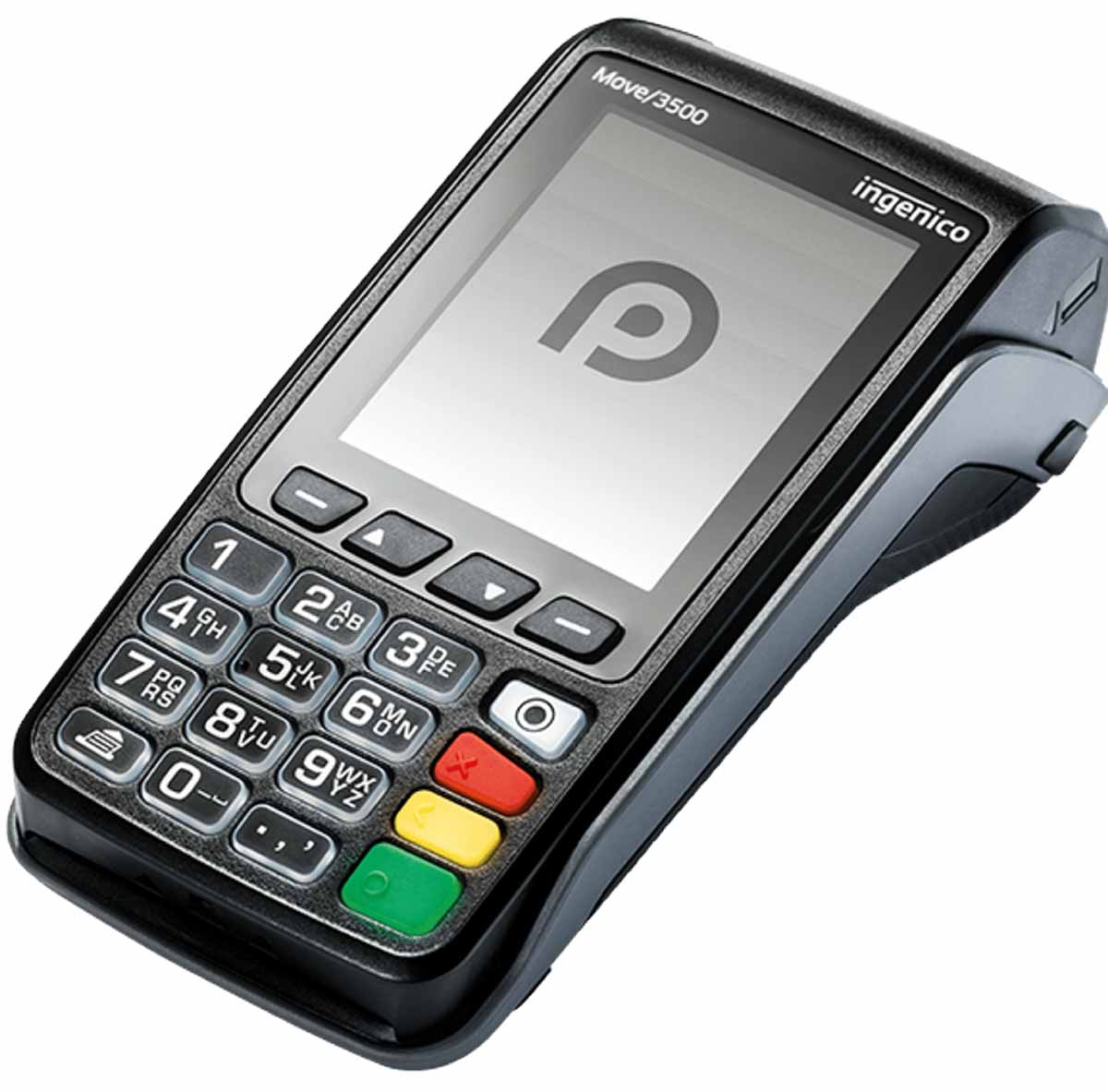
Paymentsense is a great option for businesses that need a more mobile solution. The portable terminal is perfect for on-the-go transactions, and it provides fast and secure payments.
- Pros: Great for businesses needing a mobile solution with fast and secure payments.
- Cons: It may not be suitable for businesses needing a countertop solution.
Fees and charges
- Card Reader Cost: Paymentsense Mobile Card Reader: £29 + VAT (one-time cost)
- Transaction Fees: Chip & PIN, contactless: 1.69% per transaction
- Monthly Fee: No fixed monthly fee
- Refund Fees: £0.20 per refund
- Chargeback Fee: £25 per chargeback
- Currency Conversion Fee: 2.75% for transactions in currencies other than GBP
- Settlement Time: Next business day settlement for transactions processed before a certain cutoff time (e.g., 9 pm)
Further information
Read our Paymentsense review or visit the website.
TakePayments Mobile
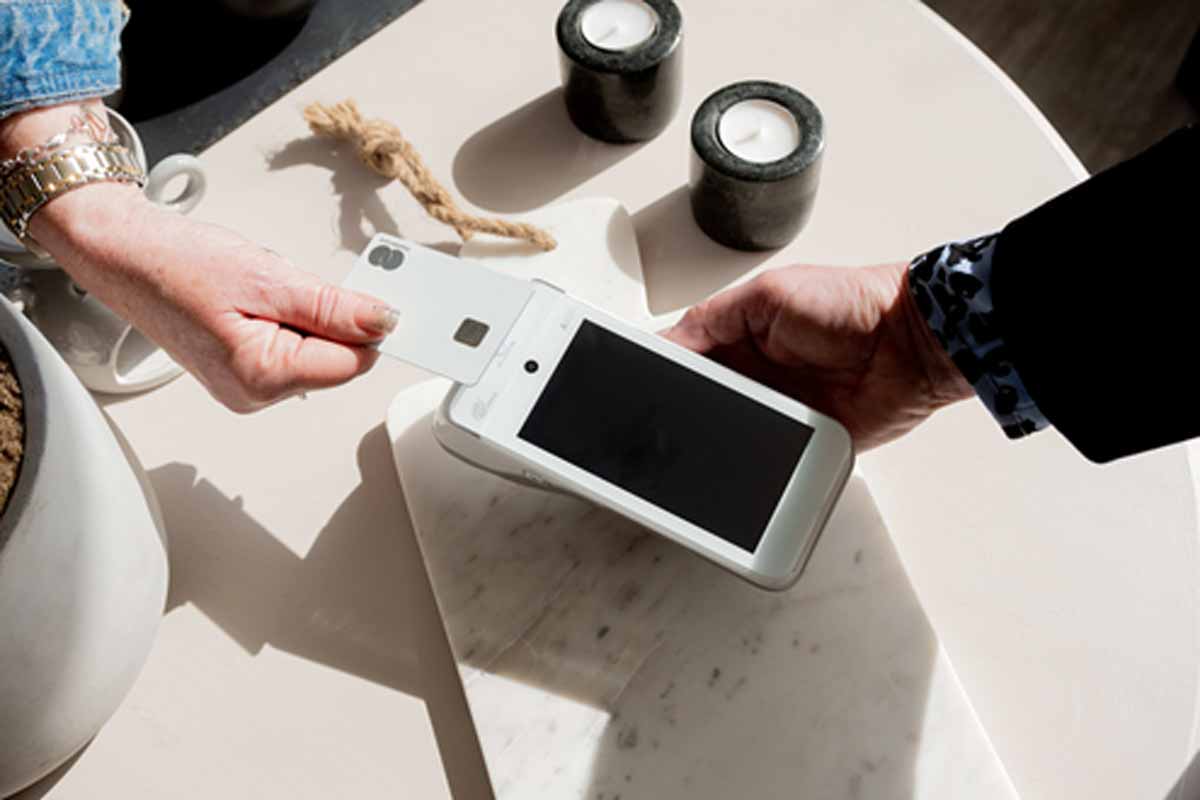
This device is suitable for businesses that value flexibility. It provides a 12-month contract as standard, a rarity in an industry that often ties you in for longer. See our TakePayments guide.
- Pros: Provides flexibility with a 12-month contract as standard.
- Cons: Lack of advanced features compared to other options.
Fees and charges
- Card Reader Cost: TakePayments Mobile Card Reader: £39.95 + VAT (one-time cost)
- Transaction Fees: Chip & PIN, contactless: 1.25% – 2.5% per transaction, depending on your monthly card turnover and business type
- Monthly Fee: No fixed monthly fee
- Refund Fees: £0.10 to £0.50 per refund, depending on your pricing plan
- Chargeback Fee: £15 – £25 per chargeback, depending on your pricing plan
- Currency Conversion Fee: 2.99% for transactions in currencies other than GBP
- Settlement Time: Next business day settlement for transactions processed before a certain cutoff time (e.g., 9 pm)
Further information
Read our TakePayments review or visit the website.
EPOS Now
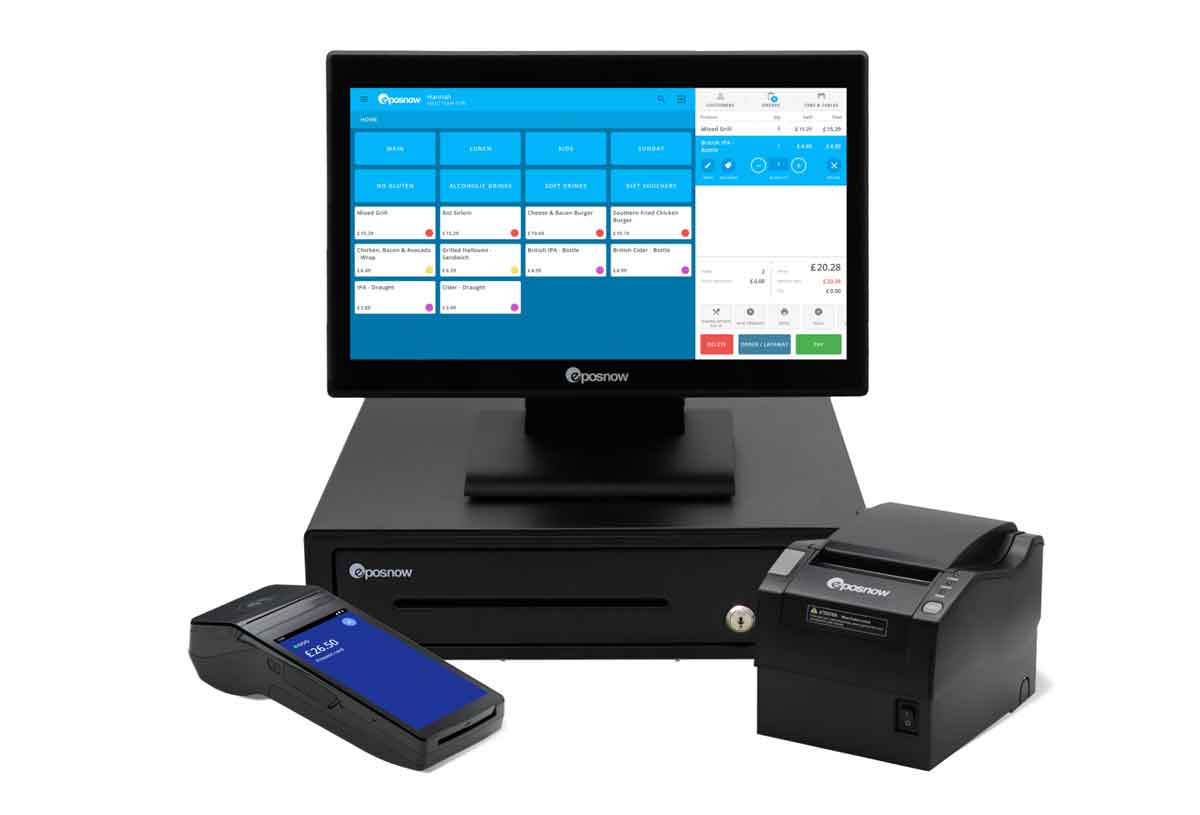
This comprehensive POS solution is perfect for retail or hospitality businesses that need more than just card processing. It’s higher in price, but it comes with a fully functional system that can manage your entire business. Learn more about Epos Now here.
- Pros: Comprehensive POS solution, perfect for retail or hospitality businesses.
- Cons: Higher in price, and may be too complex for businesses needing simpler solutions.
Fees and charges
- Card Reader Cost: The cost of card readers offered by EPOS Now can vary, typically ranging from £150 to £500 + VAT for purchase, or they might offer rental options starting from £20 to £50 per month.
- Transaction Fees: Transaction fees typically range from 1.5% to 2.5% per transaction, depending on factors such as your business type, monthly card turnover, and the type of cards accepted.
- Monthly Fee: EPOS Now may charge a monthly fee for their payment processing services, which can vary from £20 to £50 per month, depending on the package and features included.
- Refund Fees: Refund fees may apply and usually range from £0.10 to £0.50 per refund, depending on your pricing plan.
- Chargeback Fee: Chargeback fees can vary but typically range from £15 to £25 per chargeback.
- Currency Conversion Fee: Currency conversion fees may apply for transactions in currencies other than GBP, usually around 2.5% to 3% of the transaction amount.
- Settlement Time: Funds are typically settled into your bank account within 1 to 3 business days after the transaction is processed.
Please note that these figures are indicative and may vary based on your specific agreement with EPOS Now, as well as other factors such as card network fees and regulatory requirements. For precise pricing information tailored to your business needs, it’s advisable to contact EPOS Now directly.
Further information
Read our EPOS Now review or visit the website.
myPOS Go 2
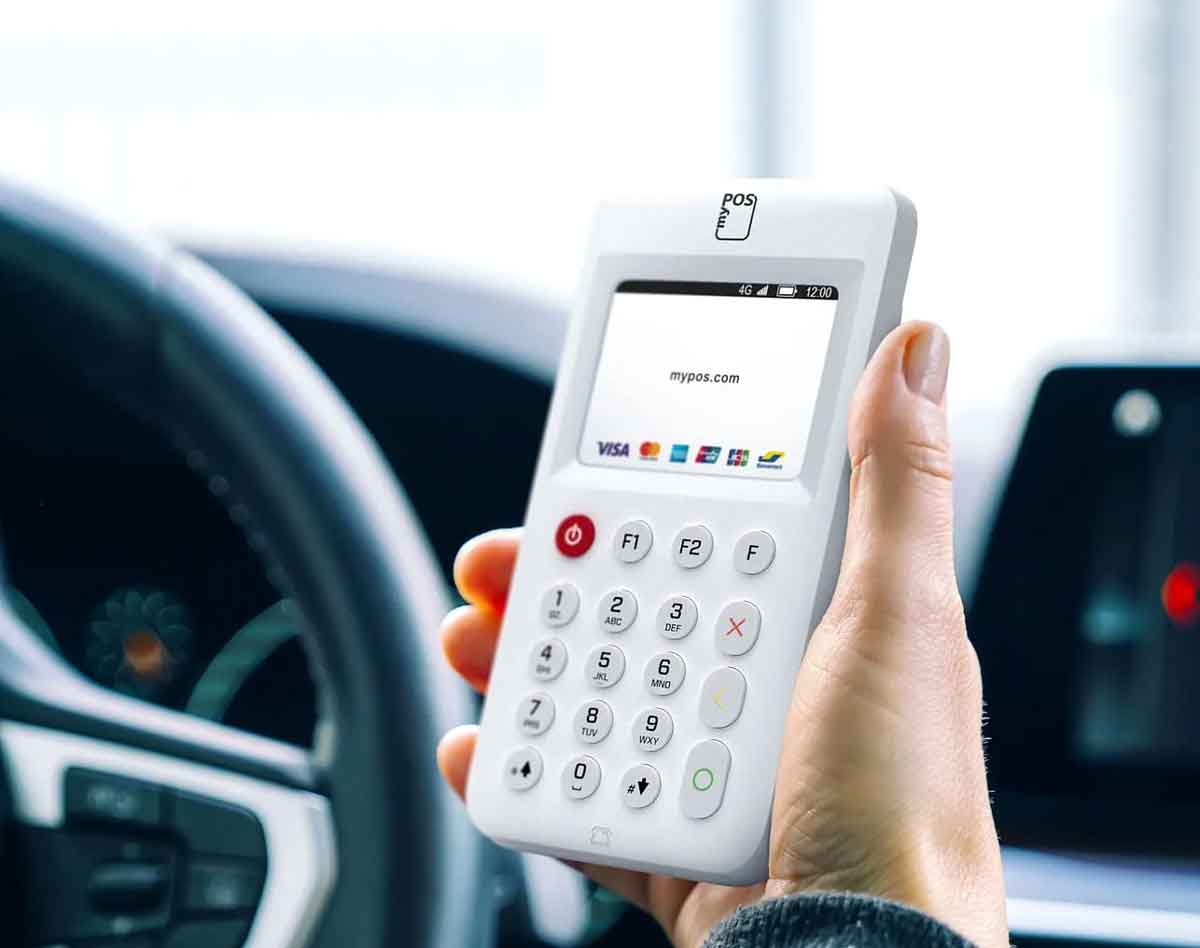
myPOS Go offers a very low upfront cost, making it perfect for startups and small businesses. It has no monthly fees and offers a free e-money account for instant access to accepted payments.
- Pros: Very low upfront cost and no monthly fees.
- Cons: The higher per-transaction cost may add up for businesses with larger transaction volumes.
Fees and charges
- Card Reader Cost: myPOS Go Card Reader: £29 + VAT (one-time cost)
- Transaction Fees: Chip & PIN, contactless: 1.75% per transaction
- Monthly Fee: No fixed monthly fee
- Refund Fees: Refunds are free
- Chargeback Fee: £25 per chargeback
- Currency Conversion Fee: 2.5% for transactions in currencies other than GBP
- Settlement Time: Next business day settlement for transactions processed before a certain cutoff time (e.g., 9 pm)
Further information
Read our myPOS review or visit the website.
Handepay
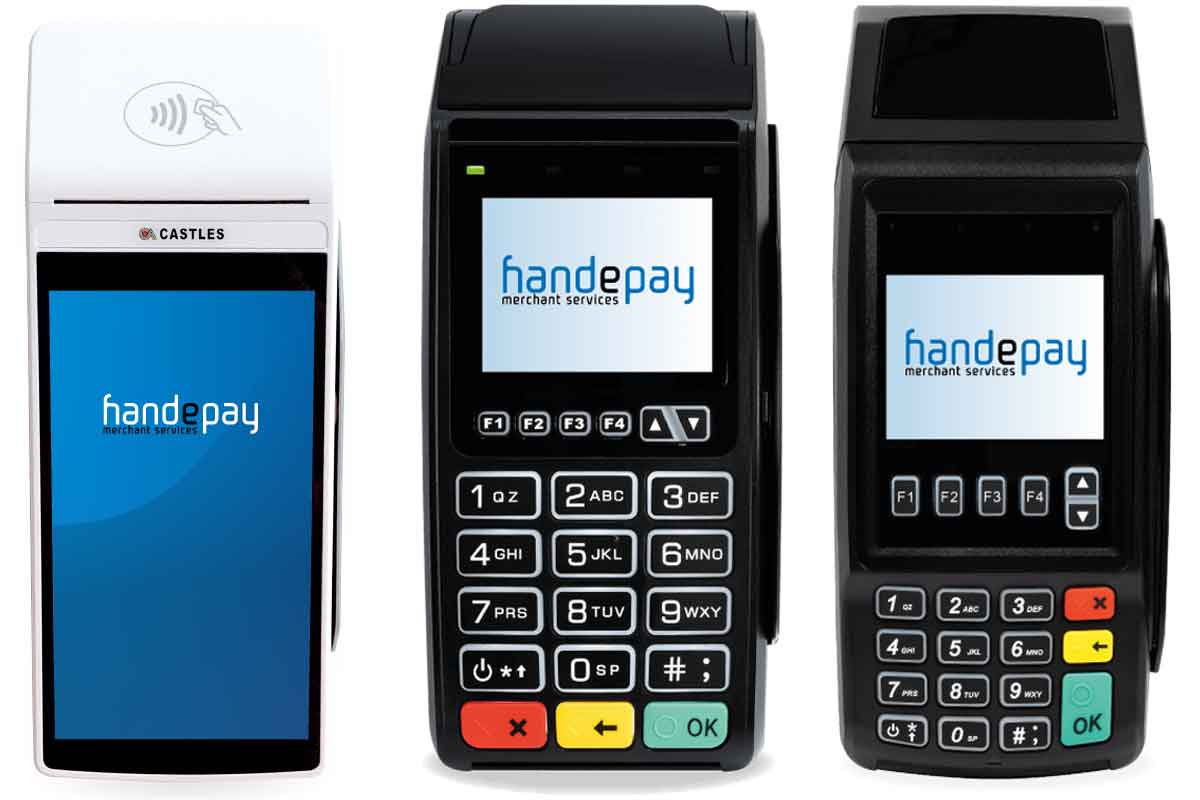
A reliable choice for small businesses, Handepay offers low-cost card machines and promises to refund the difference if you don’t save compared to your current provider.
- Pros: Low-cost machines and promises to refund the difference if you don’t save compared to your current provider.
- Cons: May not offer as many features as some of the other providers.
Fees and charges
- Card Reader Cost: Handepay card reader: Typically provided for free or at a discounted rate as part of a contract agreement. Specific costs may vary depending on the type of card reader and any ongoing promotions.
- Transaction Fees: Chip & PIN, contactless: Transaction fees vary depending on factors such as your business type, monthly turnover, and the type of cards accepted. Typically, rates range from 1.0% to 2.5% per transaction.
- Monthly Fee: Monthly fees can vary based on your specific agreement and the services included. It’s common for providers like Handepay to offer bespoke pricing packages tailored to individual business needs.
- Refund Fees: Handepay may charge a fee per refund transaction, usually ranging from £0.10 to £0.50 per refund.
- Chargeback Fee: Chargeback fees may apply if a customer disputes a transaction and initiates a chargeback. The exact fee amount can vary and should be confirmed directly with Handepay.
- Currency Conversion Fee: If you accept transactions in currencies other than GBP, currency conversion fees may apply. These fees are typically a percentage of the transaction amount and should be clarified with Handepay.
- Settlement Time: Handepay’s settlement times can vary depending on factors such as the payment processor used and the terms of your agreement. Typically, funds are deposited into your bank account within a few business days after the transaction is processed.
Further information
Read our Handepay review or visit the website.
Zettle Pro

Zettle Pro offers more features than the standard version, including a customer loyalty program. It’s more suited to businesses with higher transaction volumes.
- Pros: More features than the standard version, including a customer loyalty program.
- Cons: Higher price point than the regular iZettle Reader.
Fees and charges
- Subscription Cost: Zettle Pro subscription: Typically starts from £29 to £99 per month, depending on the plan selected and features included.
- Transaction Fees: Chip & PIN, contactless: Transaction fees typically range from 1.0% to 2.5% per transaction, depending on factors such as your business type and monthly turnover.
- Monthly Fee: Zettle Pro may charge a monthly fee in addition to the subscription cost, usually ranging from £10 to £30 per month, depending on the plan and services included.
- Refund Fees: Typically range from £0.10 to £0.50 per refund transaction.
- Chargeback Fee: Chargeback fees may apply if a customer disputes a transaction, usually ranging from £15 to £25 per chargeback.
- Currency Conversion Fee: If you accept transactions in currencies other than GBP, currency conversion fees may apply, typically around 2.5% to 3% of the transaction amount.
- Settlement Time: Funds are typically settled into your bank account within 1 to 3 business days after the transaction is processed.
Further information
Read our Zettle review or visit the website.
Shopify POS
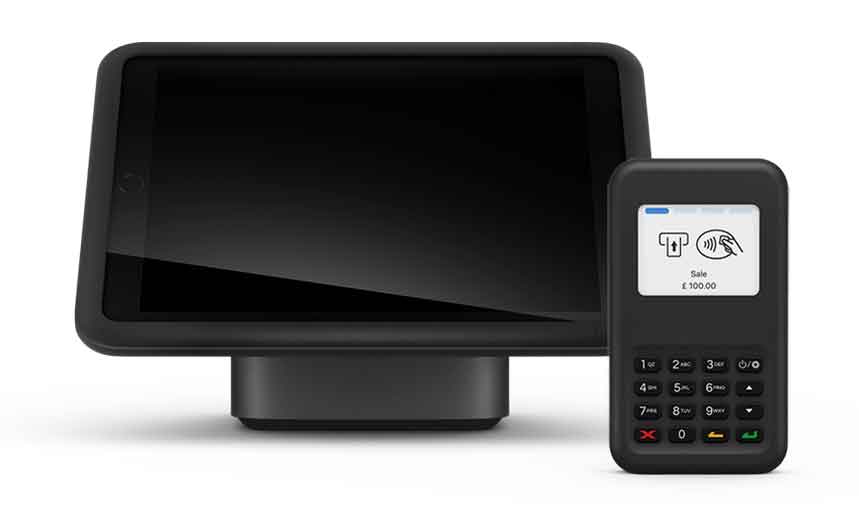
Ideal for businesses that have both online and physical stores, Shopify POS integrates seamlessly with the Shopify ecommerce platform, providing a unified solution for your business.
- Pros: Ideal for businesses with both online and physical stores, as it integrates seamlessly with Shopify.
- Cons: Requires a Shopify subscription, which may not be suitable for all businesses.
Fees and charges
- Subscription Cost: Shopify POS subscription: Pricing can vary depending on your chosen plan. The Basic Shopify plan starts at £29 per month, the Shopify plan starts at £79 per month, and the Advanced Shopify plan starts at £299 per month. Additional fees may apply if you opt for the Shopify Plus plan, which is tailored for larger businesses.
- Transaction Fees:
- Online transactions: Transaction fees vary depending on your chosen Shopify plan. For the Basic Shopify plan, the fee is 2.2% + 20p per transaction, for the Shopify plan, it’s 1.9% + 20p, and for the Advanced Shopify plan, it’s 1.6% + 20p.
- In-person transactions: If you use Shopify Payments as your payment processor, the fee for in-person transactions ranges from 1.6% to 2.2% + 0p, depending on your chosen Shopify plan. Additional fees may apply if you use a third-party payment provider.
- Card Reader Cost: Shopify offers various card readers compatible with their POS system. The cost of these readers varies depending on the model and any ongoing promotions. Prices typically range from £29 to £149.
- Monthly Fee: In addition to transaction fees, Shopify POS may charge a monthly fee for their services. This fee is determined by your chosen plan and any additional features you require.
- Refund Fees: Refund fees may apply for processing refunds. These fees typically range from £0.10 to £0.50 per refund transaction, depending on your plan.
- Chargeback Fee: Chargeback fees may apply if a customer disputes a transaction. The exact fee amount can vary depending on your chosen plan and the circumstances of the chargeback.
- Currency Conversion Fee: If you accept transactions in currencies other than GBP, currency conversion fees may apply. These fees are typically a percentage of the transaction amount and should be clarified with Shopify.
Further information
Read our Shopify review or visit the website.
Clover Mini
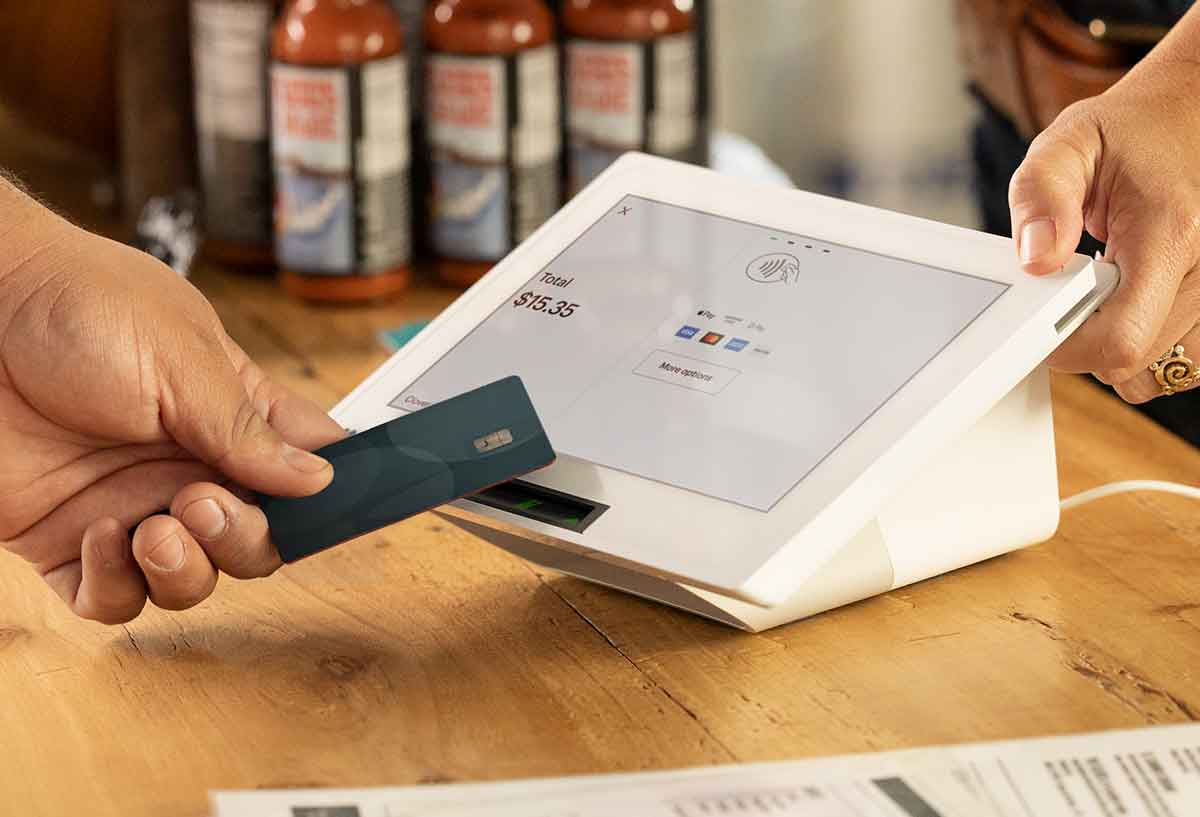
This machine comes with a larger screen for an improved user interface. It also offers more advanced features, such as inventory tracking, making it great for businesses looking for a more comprehensive solution. See our Clover guide.
- Pros: Offers advanced features like inventory tracking, larger screen for improved user interface.
- Cons: Higher price point and transaction fees.
Fees and charges
- Hardware Cost: Clover Mini device: Typically ranges from £400 to £600+ VAT for purchase. Alternatively, it may be available for lease or rental at a monthly fee ranging from £20 to £40.
- Transaction Fees: Chip & PIN, contactless: Transaction fees typically range from 1.5% to 2.5% per transaction, with an additional fixed fee per transaction of around £0.05 to £0.30.
- Monthly Fee: Monthly fees for using the Clover Mini device and accessing payment processing services typically range from £15 to £30 per month. These fees may vary based on your business type and the features included in your plan.
- Refund Fees: Refund fees: Some merchant service providers may charge a fee for processing refunds, typically ranging from £0.10 to £0.50 per refund transaction.
- Chargeback Fee: Chargeback fees may apply if a customer disputes a transaction, usually ranging from £15 to £25 per chargeback.
- Currency Conversion Fee: Currency conversion fees may apply for transactions in currencies other than GBP, typically around 2.5% to 3% of the transaction amount.
- Settlement Time: Funds are typically settled into your bank account within 1 to 3 business days after the transaction is processed, although settlement times may vary depending on your merchant service provider.
Further information
Read our Clover review or visit the website.
Elavon MobileMerchant
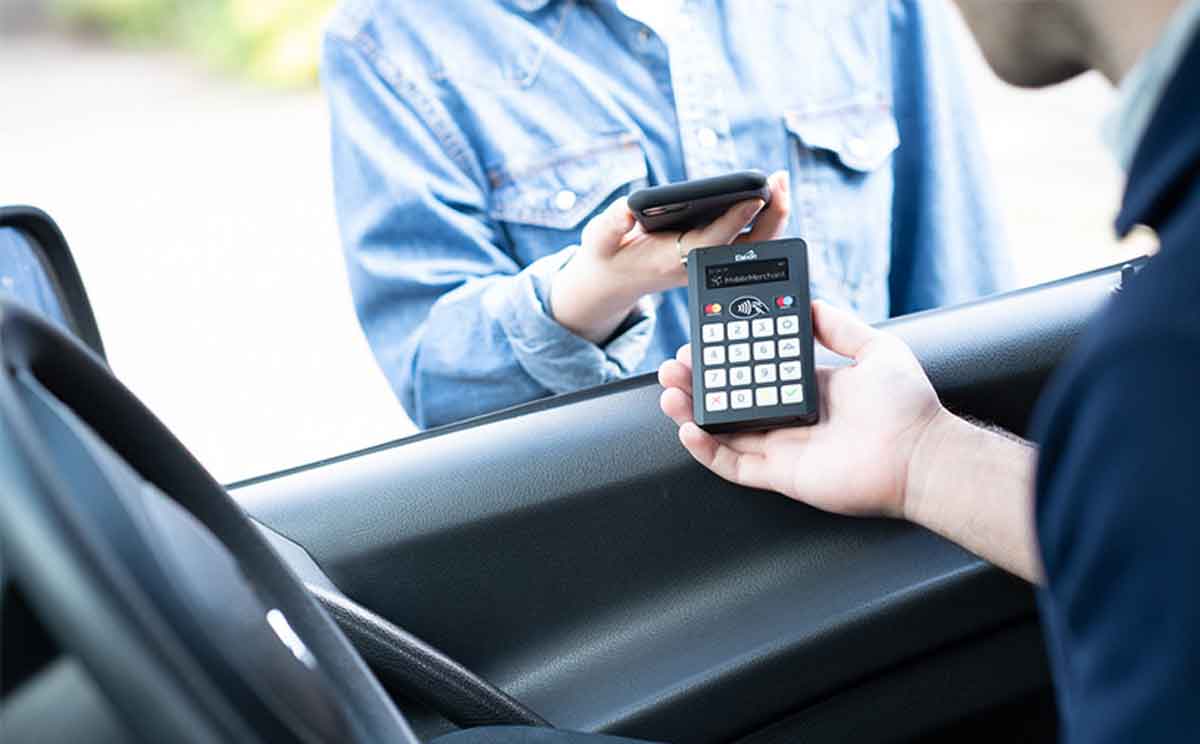
Known for its secure and fast transaction processing, this machine is more suitable for businesses with a high volume of transactions. It is also well-regarded for its strong customer service. See our Elavon guide.
- Pros: Known for secure and fast transaction processing and strong customer service.
- Cons: May not be suitable for small businesses due to higher transaction fees for lower volume of transactions.
Fees and charges
- Card Reader Cost: Elavon’s MobileMerchant card reader: The cost of the card reader varies depending on the model and any promotions available. Typically, it ranges from £29 to £99 + VAT for purchase.
- Transaction Fees: Chip & PIN, contactless: Transaction fees vary depending on your business type, monthly turnover, and the type of cards accepted. Typically, rates range from 1.5% to 2.5% per transaction.
- Monthly Fee: Elavon may charge a monthly fee for their MobileMerchant service. The exact amount can vary depending on your chosen plan and any additional features included. Monthly fees typically range from £10 to £30.
- Refund Fees: Refund fees may apply for processing refunds. These fees are typically a fixed amount per refund transaction, ranging from £0.10 to £0.50.
- Chargeback Fee: Chargeback fees may apply if a customer disputes a transaction and initiates a chargeback. The exact fee amount can vary and should be confirmed directly with Elavon.
- Currency Conversion Fee: If you accept transactions in currencies other than GBP, currency conversion fees may apply. These fees are typically a percentage of the transaction amount, usually around 2.5% to 3%.
- Settlement Time: Funds are typically settled into your bank account within 1 to 3 business days after the transaction is processed.
Further information
Read our Elavon review or visit the website.
Remember, what works best for your business will depend on your specific needs, including your transaction volume, budget, and whether you need a portable or countertop device.
Features to look for in a credit card machine
When choosing the best credit card machine for your small business, several important features can impact how effectively the machine will meet your needs:
- Ease of Use: The credit card machine should be intuitive and user-friendly. The easier it is for your staff to use, the faster the transaction process will be. This can significantly improve the customer experience.
- Transaction Speed: Fast transaction speeds are crucial in maintaining efficient business operations, particularly during peak hours. Look for machines that can process payments swiftly to reduce customer waiting times.
- Transaction Fees: Different providers have different fee structures. Some charge a flat rate per transaction, while others may have variable rates. Understanding the transaction fees can help you make a cost-effective choice.
- Portability: If your business model requires you to move around a lot (like at trade fairs or food trucks), a portable and wireless credit card machine would be an ideal choice.
- Integration: The machine should ideally be able to integrate with your existing systems. This includes accounting software, inventory systems, and CRM software. This can help in streamlining business operations and making transaction data easier to manage.
- Reliability: A credit card machine that frequently malfunctions can lead to lost sales and frustrated customers. Check out reviews and recommendations to ensure that the machine you choose is reliable and has good customer support.
- Security: Credit card fraud is a real concern, so it’s crucial to choose a machine that provides robust security features to protect your customers’ card information.
- Connectivity Options: The device should offer a range of connectivity options, including Bluetooth, WiFi, and mobile network connections, ensuring you can process payments in various scenarios.
- Receipt Options: While many customers prefer digital receipts sent via email or text, some still prefer a printed receipt. It’s beneficial to have a credit card machine that offers both options for greater flexibility.
- Contactless Payment Support: With the increasing popularity of contactless payment methods like Apple Pay and Google Pay, it’s essential for your credit card machine to support these options.
When choosing a credit card machine, consider these features carefully. They can make a significant difference to the efficiency of your payment process, the satisfaction of your customers, and ultimately, your business’s bottom line.
FAQ
A credit card machine, also known as a card reader or PDQ machine, is a device that enables businesses to accept credit or debit card payments. It reads the information on the card’s chip or magnetic strip and securely transmits the data to complete the transaction.
A credit card machine reads the card details provided by the customer, either by swiping, inserting, or tapping their card, or by inputting the card details manually. The machine then sends this information to the merchant’s bank, which communicates with the customer’s bank to check if the funds are available. If approved, the funds are transferred to the merchant’s account.
Yes, a merchant account is typically required to use a credit card machine. A merchant account is a type of bank account that allows businesses to accept payments in multiple ways, usually debit or credit cards.
The cost of a credit card machine can vary greatly depending on the provider, features, and whether it’s a countertop or mobile device. Upfront costs for the card machines themselves can range from under £20 to several hundred pounds.
Transaction fees are charges that are applied every time a business processes a card payment. These fees are usually a small percentage of the transaction value and sometimes a small fixed fee. They are important to consider because they can impact your business’s overall costs and profit margins.
No, most credit card machines can also accept debit cards. Many modern machines also accept contactless payments, including mobile wallet payments like Apple Pay and Google Pay.
For online businesses, you won’t need a physical credit card machine. Instead, you’ll use a payment gateway to process credit and debit card transactions.
Remember, it’s essential to choose a credit card machine that aligns with your business needs and fits within your budget while providing a secure, efficient, and convenient way for customers to transact with your business.

